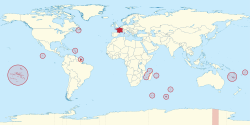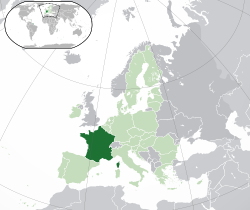France
| French Republic
République française (French)
|
|
|---|---|
|
Location of metropolitan France (dark green)
|
|

|
|
| Capital and largest city |
Paris 48°51′N 2°21′E |
| Official language and national language |
French[I] |
| Nationality (2010) | |
| Religion (2016) |
|
| Demonym | French |
| Government | Unitary semi‑presidential constitutional republic |
| Emmanuel Macron | |
| Édouard Philippe | |
| Gérard Larcher | |
| François de Rugy | |
| Legislature | Parliament |
| Senate | |
| National Assembly | |
| Establishment | |
|
• Francia unified
|
486 |
| August 843 | |
| 22 September 1792 | |
| 1 January 1958 | |
| 4 October 1958 | |
| Area | |
|
• Total
|
640,679 km2 (247,368 sq mi) |
|
• Metropolitan France (IGN)
|
551,695 km2 (213,011 sq mi) |
|
• Metropolitan France (Cadastre)
|
543,940.9 km2 (210,016.8 sq mi) |
| Population | |
|
• 2017 estimate
|
|
|
• Density
|
104/km2 (270/sq mi) (106th) |
|
• Metropolitan France, estimate as of December 2017
|
|
|
• Density
|
116/km2 (300.4/sq mi) (89th) |
| GDP (PPP) | 2017 estimate |
|
• Total
|
$2.835 trillion[7] (10th) |
|
• Per capita
|
$43,760[7] (26th) |
| GDP (nominal) | 2017 estimate |
|
• Total
|
$2.583 trillion[7] (7th) |
|
• Per capita
|
$39,869[7] (22nd) |
| Gini (2013) | 30.1[8] medium |
| HDI (2015) | very high · 21st |
| Currency | |
| Time zone | Central European Time (UTC+1) |
|
• Summer (DST)
|
Central European Summer Time[X] |
| Note: various other time zones are observed in overseas France.[IX] | |
| Date format | dd/mm/yyyy (AD) |
| Drives on the | right |
| Calling code | +33[XI] |
| ISO 3166 code | FR |
| Internet TLD | .fr[XII] |
|
Source
gives area of metropolitan France as 551,500 km2 (212,900 sq mi) and
lists overseas regions separately, whose areas sum to 89,179 km2
(34,432 sq mi). Adding these give the total shown here for the entire
French Republic. The CIA reports the total as 643,801 km2 (248,573 sq
mi).
|
|
During the Iron Age, what is now metropolitan France was inhabited by the Gauls, a Celtic people. Rome annexed the area in 51 BC, holding it until the arrival of Germanic Franks in 476, who formed the Kingdom of France. France emerged as a major European power in the Late Middle Ages following its victory in the Hundred Years' War (1337 to 1453). During the Renaissance, French culture flourished and a global colonial empire was established, which by the 20th century would be the second largest in the world.[11] The 16th century was dominated by religious civil wars between Catholics and Protestants (Huguenots). France became Europe's dominant cultural, political, and military power under Louis XIV.[12] In the late 18th century, the French Revolution overthrew the absolute monarchy, established one of modern history's earliest republics, and saw the drafting of the Declaration of the Rights of Man and of the Citizen, which expresses the nation's ideals to this day.
In the 19th century Napoleon took power and established the First French Empire. His subsequent Napoleonic Wars shaped the course of continental Europe. Following the collapse of the Empire, France endured a tumultuous succession of governments culminating with the establishment of the French Third Republic in 1870. France was a major participant in World War I, from which it emerged victorious, and was one of the Allied Powers in World War II, but came under occupation by the Axis powers in 1940. Following liberation in 1944, a Fourth Republic was established and later dissolved in the course of the Algerian War. The Fifth Republic, led by Charles de Gaulle, was formed in 1958 and remains today. Algeria and nearly all the other colonies became independent in the 1960s and typically retained close economic and military connections with France.
France has long been a global centre of art, science, and philosophy. It hosts Europe's third-largest number of cultural UNESCO World Heritage Sites and leads the world in tourism, receiving around 83 million foreign visitors annually.[13] France is a developed country with the world's seventh-largest economy by nominal GDP,[14] and ninth-largest by purchasing power parity.[15] In terms of aggregate household wealth, it ranks fourth in the world.[16] France performs well in international rankings of education, health care, life expectancy, and human development.[17][18] France is globally considered a great power in the world,[19] being one of the five permanent members of the United Nations Security Council with the power to veto and is an official nuclear-weapon state. It is a leading member state of the European Union and the Eurozone.[20] It is also a member of the Group of 7, North Atlantic Treaty Organization (NATO), Organisation for Economic Co-operation and Development (OECD), the World Trade Organization (WTO), and La Francophonie.




No comments:
Post a Comment